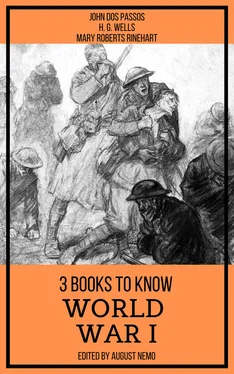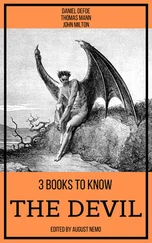A warm drowsiness came over him. From the field kitchen alongside came the voice of a man singing:
“O my girl's a lulu, every inch a lulu,
Is Lulu, that pretty lil' girl o' mi-ine.”
In their mud nests the young swallows twittered faintly overhead. Now and then there was a beat of wings and a big swallow skimmed into the shack. Chrisfield's cheeks began to feel very softly flushed. His head drooped over on his chest. Outside the cook was singing over and over again in a low voice, amid a faint clatter of pans:
“O my girl's a lulu, every inch a lulu,
Is Lulu, that pretty lil' girl o' mi-ine.”
Chrisfield fell asleep.
He woke up with a start. The shack was almost dark. A tall man stood out black against the bright oblong of the door.
“What are you doing here?” said a deep snarling voice.
Chrisfield's eyes blinked. Automatically he got to his feet; it might be an officer. His eyes focussed suddenly. It was Anderson's face that was between him and the light. In the greenish obscurity the skin looked chalk-white in contrast to the heavy eyebrows that met over the nose and the dark stubble on the chin.
“How is it you ain't out with the company?”
“Ah'm barracks guard,” muttered Chrisfield. He could feel the blood beating in his wrists and temples, stinging his eyes like fire. He was staring at the floor in front of Anderson's feet.
“Orders was all the companies was to go out an' not leave any guard.”
“Ah!'
“We'll see about that when Sergeant Higgins comes in. Is this place tidy?”
“You say Ah'm a goddamed liar, do ye?” Chrisfield felt suddenly cool and joyous. He felt anger taking possession of him. He seemed to be standing somewhere away from himself watching himself get angry.
“This place has got to be cleaned up.... That damn General may come back to look over quarters,” went on Anderson coolly.
“You call me a goddam liar,” said Chrisfield again, putting as much insolence as he could summon into his voice. “Ah guess you doan' remember me.”
“Yes, I know, you're the guy tried to run a knife into me once,” said Anderson coolly, squaring his shoulders. “I guess you've learned a little discipline by this time. Anyhow you've got to clean this place up. God, they haven't even brushed the birds' nests down! Must be some company!” said Anderson with a half laugh.
“Ah ain't agoin' to neither, fur you.”
“Look here, you do it or it'll be the worse for you,” shouted the sergeant in his deep rasping voice.
“If ever Ah gits out o' the army Ah'm goin' to shoot you. You've picked on me enough.” Chrisfield spoke slowly, as coolly as Anderson.
“Well, we'll see what a court-martial has to say to that.”
“Ah doan give a hoot in hell what ye do.”
Sergeant Anderson turned on his heel and went out, twisting the corner button of his tunic in his big fingers. Already the sound of tramping feet was heard and the shouted order, “Dis-missed.” Then men crowded into the shack, laughing and talking. Chrisfield sat still on the end of the bunk, looking at the bright oblong of the door. Outside he saw Anderson talking to Sergeant Higgins. They shook hands, and Anderson disappeared. Chrisfield heard Sergeant Higgins call after him.
“I guess the next time I see you I'll have to put my heels together an' salute.”
Andersen's booming laugh faded as he walked away.
Sergeant Higgins came into the shack and walked straight up to Chrisfield, saying in a hard official voice:
“You're under arrest.... Small, guard this man; get your gun and cartridge belt. I'll relieve you so you can get mess.”
He went out. Everyone's eyes were turned curiously on Chrisfield. Small, a red-faced man with a long nose that hung down over his upper lip, shuffled sheepishly over to his place beside Chrisfield's cot and let the butt of his rifle come down with a bang on the floor. Somebody laughed. Andrews walked up to them, a look of trouble in his blue eyes and in the lines of his lean tanned cheeks.
“What's the matter, Chris?” he asked in a low voice.
“Tol' that bastard Ah didn't give a hoot in hell what he did,” said Chrisfield in a broken voice.
“Say, Andy, I don't think I ought ter let anybody talk to him,” said Small in an apologetic tone. “I don't see why Sarge always gives me all his dirty work.”
Andrews walked off without replying.
“Never mind, Chris; they won't do nothin' to ye,” said Jenkins, grinning at him good-naturedly from the door.
“Ah doan give a hoot in hell what they do,” said Chrisfield again.
He lay back in his bunk and looked at the ceiling. The barracks was full of a bustle of cleaning up. Judkins was sweeping the floor with a broom made of dry sticks. Another man was knocking down the swallows' nests with a bayonet. The mud nests crumbled and fell on the floor and the bunks, filling the air with a flutter of feathers and a smell of birdlime. The little naked bodies, with their orange bills too big for them, gave a soft plump when they hit the boards of the floor, where they lay giving faint gasping squeaks. Meanwhile, with shrill little cries, the big swallows flew back and forth in the shanty, now and then striking the low roof.
“Say, pick 'em up, can't yer?” said Small. Judkins was sweeping the little gasping bodies out among the dust and dirt.
A stoutish man stooped and picked the little birds up one by one, puckering his lips into an expression of tenderness. He made his two hands into a nest-shaped hollow, out of which stretched the long necks and the gaping orange mouths. Andrews ran into him at the door.
“Hello, Dad,” he said. “What the hell?”
“I just picked these up.”
“So they couldn't let the poor little devils stay there? God! it looks to me as if they went out of their way to give pain to everything, bird, beast or man.”
“War ain't no picnic,” said Judkins.
“Well, God damn it, isn't that a reason for not going out of your way to raise more hell with people's feelings than you have to?”
A face with peaked chin and nose on which was stretched a parchment-colored skin appeared in the door.
“Hello, boys,” said the “Y” man. “I just thought I'd tell you I'm going to open the canteen tomorrow, in the last shack on the Beaucourt road. There'll be chocolate, ciggies, soap, and everything.”
Everybody cheered. The “Y” man beamed.
His eye lit on the little birds in Dad's hands.
“How could you?” he said. “An American soldier being deliberately cruel. I would never have believed it.”
“Ye've got somethin' to learn,” muttered Dad, waddling out into the twilight on his bandy legs.
Chrisfield had been watching the scene at the door with unseeing eyes. A terrified nervousness that he tried to beat off had come over him. It was useless to repeat to himself again and again that he didn't give a damn; the prospect of being brought up alone before all those officers, of being cross-questioned by those curt voices, frightened him. He would rather have been lashed. Whatever was he to say, he kept asking himself; he would get mixed up or say things he didn't mean to, or else he wouldn't be able to get a word out at all. If only Andy could go up with him, Andy was educated, like the officers were; he had more learning than the whole shooting-match put together. He'd be able to defend himself, and defend his friends, too, if only they'd let him.
“I felt just like those little birds that time they got the bead on our trench at Boticourt,” said Jenkins, laughing.
Chrisfield listened to the talk about him as if from another world. Already he was cut off from his outfit. He'd disappear and they'd never know or care what became of him.
The mess-call blew and the men filed out. He could hear their talk outside, and the sound of their mess-kits as they opened them. He lay on his bunk staring up into the dark. A faint blue light still came from outside, giving a curious purple color to Small's red face and long drooping nose at the end of which hung a glistening drop of moisture.
Читать дальше












